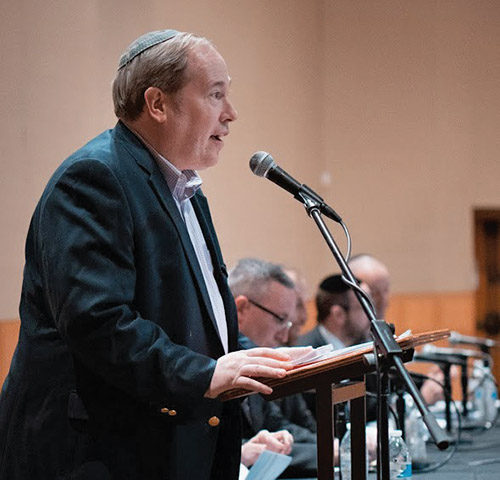


On November 4, members of the Jewish community of Bergen County and surrounding areas gathered at Congregation Keter Torah to hear a panel of experts and community leaders discuss the topic of substance and drug abuse in Modern Orthodoxy, specifically focusing on adolescent and teen use and the difficult questions surrounding how to seek treatment. Sponsored by Communities Confronting Substance Abuse, Inc. (CCSA), the panel, comprising Special Agent Timothy P. McMahon, director of Coalition & Community Services, Bergen County; Shelley Stuart; Dr. Matis Shulman; Rabbi Larry Rothwachs and Rabbi Tully Harcsztark, responded to questions such as what to do if you suspect a friend or loved one may be involved in drug use, how to get a child the treatment they need without fear of getting into trouble with the yeshivas and what the dangers are of vaping, e-cigarettes and using a Juul. Etiel Forman, a co-founder of CCSA, moderated the discussion for the over 200 people in attendance.
CCSA is a not-for-profit corporation created by Etiel Forman and his wife, Lianne. After seeking treatment for their daughter, who had been struggling with drug addiction and has since recovered, the two decided to bring her story to light as a way to help other parents dealing with similar situations. The duo has worked towards building local support groups for people with loved ones struggling with addiction, organizing educational and awareness events and working with yeshivas to establish more emotional-wellness curriculum, programming and faculty training and education. Speaking with The Jewish Link, Lianne expressed her gratitude that so many people came out to hear the discussion, and also addressed the major points she hopes the community will take from it.
“I’m happy we were able to cover as much ground as we did,” Lianne shared. “Having this discussion is now unfortunately more important than ever and really needs to be had, both in a group setting and at home between parents and their children. The big message to take from the panel here is the importance of opening that dialogue and making people more comfortable talking about a really difficult thing that so many go through. If we can find a way to continue this dialogue moving forward, we’ll be able to help so many more people.”
One of the more pressing questions at the event was how to get a child abusing substances or suffering from addiction into appropriate treatment with the support of the schools: Many yeshivas have strict rules regarding drug use, and parents may be wary of getting their child help for fear that the schools will find out about their child’s situation. Adding to the seriousness of the concern is the worry that this knowledge by the school would harm their other children’s chances of being accepted by the school, considering the competitive nature of matriculating into local yeshiva high schools. The panel deliberated the question, overall mostly agreeing that the priority needs to be getting the child the treatment they need by any means necessary and that coming forward to get help should not adversely impact the child or his/her family.
“It’s a really complex question,” Rabbi Rothwachs shared with The Jewish Link. “There are many different situations that can come up. I would seek professional help and consult with a mental health professional and get advice based on past experiences and who the kid is and what the parents have discovered. The important message is being aware that these are issues, and to be proactive in communicating with their children way before this becomes a problem. Talk to your kids, understand what’s going on in their lives, the pressures that they face. Doing so can really maybe stop them from having to deal with such a problem later down the line.”
Other topics were addressed, such as whether or not shuls should go dry in order to educate youth, and how to approach a conversation with a child when asking them about potential drug use. Those in attendance came away with a clearer understanding of how to deal with such issues and, overall, felt that the event was beneficial. An NBC News representative was also in attendance, covering the event as part of a documentary about the opioid epidemic.
If you or someone you know needs emergency help, call the national substance abuse and mental health helpline at 1-800-662-HELP (4357). If you are interested in learning more about Communities Confronting Substance Abuse, Inc., visit https://www.time2talkaddiction.org/. Additionally you can reach out directly to Lianne by email at [email protected].
CCSA encourages an open dialogue about drug addiction; if you’d like to ask them a question anonymously, you can do so at https://www.time2talkaddiction.org/submit-a-question.
By Adam Samuel
Adam Samuel is a journalist from Teaneck. He blogs at adamssoapbox.com.













